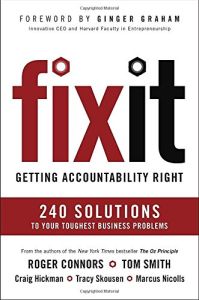Зарегистрируйтесь на getAbstract, чтобы получить доступ к этому краткому изложению.

Зарегистрируйтесь на getAbstract, чтобы получить доступ к этому краткому изложению.
Roger Connors and Tom Smith
Fix It
Getting Accountability Right
Portfolio, 2016
Что внутри?
Don’t live “Below the Line” where blame lurks. Instead, find and fix your “accountability gaps.”
Recommendation
Despite leaders’ efforts to engage employees, an “accountability gap” threatens organizational productivity and growth. Management experts Roger Connors and Tom Smith help you determine whether you, your team or your organization face an accountability gap and offer answers enabling you to “fix it” by building “16 Accountability Traits,” such as using feedback, learning from experience, owning problems and keeping your word. Analyzing a three-year study involving more than 40,000 poll responses, this practical sequel to the authors’ 1994 bestseller, The Oz Principle, offers hundreds of ideas based on real-life situations to help you close accountability gaps for yourself, your team and your firm. Though the text is rife with too-cute terms and lots of consultant jargon, getAbstract recommends this useful manual to leaders, managers or employees who seek to do what they say and encourage others to do the same.
Summary
About the Authors
Co-authors of the 1994 bestseller The Oz Principle, accountability experts Roger Connors and Tom Smith run the Partners in Leadership consultancy.





















Comment on this summary